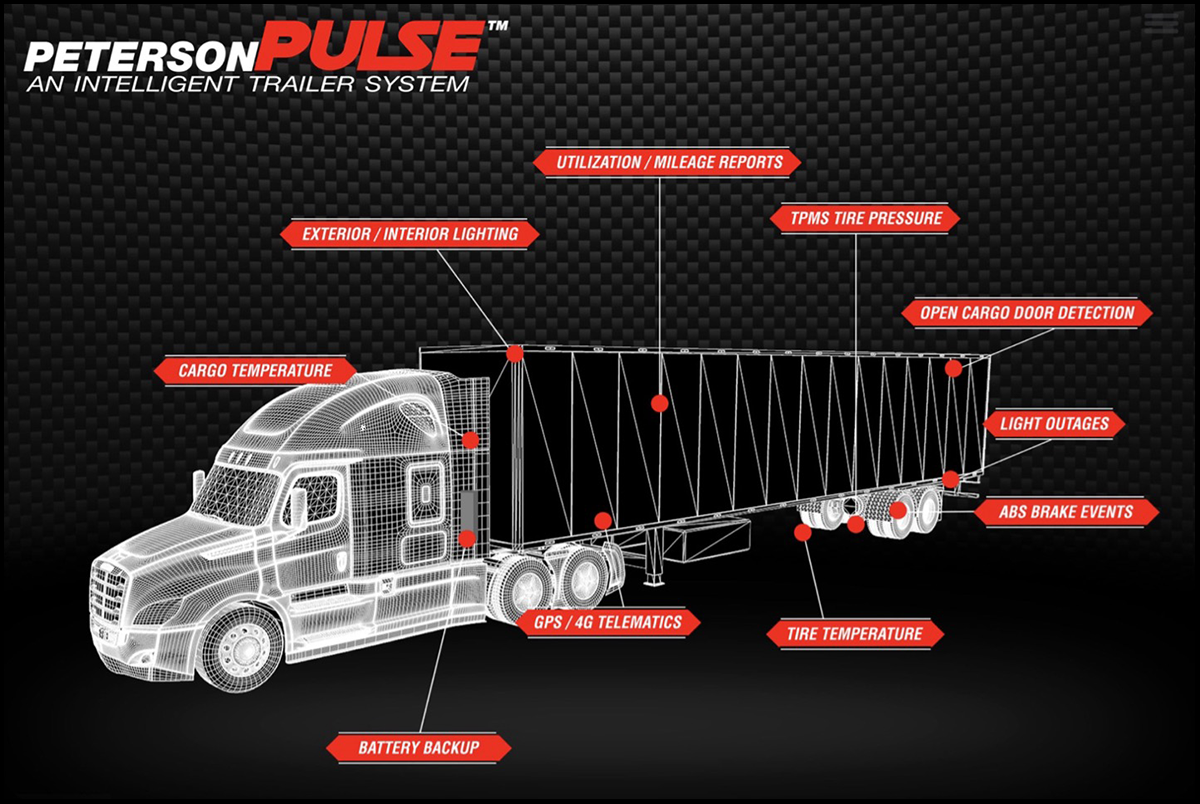
Peterson Manufacturing Company
The future of connected trailers holds exciting possibilities. Driven by advancements in technology and ever-evolving needs, the transportation industry will continue to demand more advanced solutions to drive higher efficiencies and safety, and lower downtime. When we think about how far we have come – sensors, GPS, telematics, data – it’s not hard to believe the possibilities of where we can go as an industry. Here are just a few ways in which the role that connectivity plays can grow:
- Real-Time Monitoring and Analytics: Connected trailers will continue to integrate advanced sensors and communication systems with advancing levels of detail, allowing for real-time monitoring of various parameters such as location, temperature, humidity, and cargo condition. This data will be analyzed to optimize logistics operations, improve efficiency, and enhance safety.
- Predictive Maintenance: Utilizing data analytics and machine learning algorithms, connected trailers will be able to take maintenance one step further, actually predicting maintenance issues before they occur. By monitoring the condition of components like tires, brakes, and axles, fleets can schedule proactive maintenance, thereby reducing downtime and extending the lifespan of equipment. The preventative aspect of a connected trailer cannot be emphasized enough in its power to prevent an accident or unnecessary delays in delivery. With better information will come the ability to make better decisions.
- The Autonomous Connection: The future of connected trailers will be intertwined with the advancement of autonomous vehicles. Trailers equipped with sensors and communication technology will become increasingly integrated into autonomous vehicle systems. This will enable them to communicate with other vehicles, infrastructure, and centralized control systems to optimize routes, manage traffic flow, and enhance safety. Connected trailers as well may incorporate autonomous capabilities such as self-driving functionality for short distances, automated docking and undocking processes, and convoy systems for highway transportation. These futures are inextricably linked.
- Blockchain Integration: Blockchain technology could revolutionize supply chain management by providing secure, transparent, and tamper-proof records of trailer movements, cargo transfers, and contractual agreements. This could streamline operations, reduce disputes, and enhance trust between stakeholders.
- Environmental Sustainability: Connected trailers will play a vital role in promoting environmental sustainability by optimizing route planning to minimize fuel consumption and greenhouse gas emissions. Integration with alternative fuel technologies, such as electric and hydrogen-powered vehicles, will further reduce the carbon footprint of transportation.
- Enhanced Security: Advanced security features, including biometric authentication, geofencing, and tamper-evident seals, will be integrated into connected trailers to prevent theft, unauthorized access, and cargo tampering. Real-time alerts and remote monitoring capabilities will enhance security and enable rapid response to incidents.
- Integration with Smart Infrastructure: Connected trailers will interact with smart infrastructure elements such as traffic management systems, toll booths, and roadside sensors to optimize traffic flow, improve safety, and reduce congestion. This integration will enable more efficient and seamless transportation operations, while also reinforcing the ability of autonomous vehicles to exist.
Overall, the future of connected trailers is characterized by ever-increasing connectivity, automation, efficiency, and sustainability. By embracing and predicting these advancements, the transportation industry can address emerging challenges and create a more resilient and responsive supply chain.
To find out more information about Peterson Manufacturing’s answer to connectivity, visit https://petersonlightsandharnesses.com/petersonpulse-trailer-system/. The PetersonPulse® Smart Trailer System is the latest in connected trailer technology from Peterson. The PetersonPulse® exclusively offers individual light out detection. The system monitors the current draw of each individual lamp so drivers will know not just that a light is out, but specifically which light is faulty. In addition, the PetersonPulse® is completely customizable based on the specific needs of each customer.
Peterson Manufacturing Company
Founded in 1945, Peterson Manufacturing Company is a world-leading innovator in the design, engineering and manufacturing of a complete line of commercial vehicle/trailer safety lighting and harness systems. With headquarters in the greater Kansas City area, Peterson is a privately held company. An ISO 9001:2015 certified company, Peterson Manufacturing is a key subsidiary of Peterson Corporation, five highly specialized companies and nearly 700 associates working in global transportation-related industries. For more information, visit PMLights.com.
